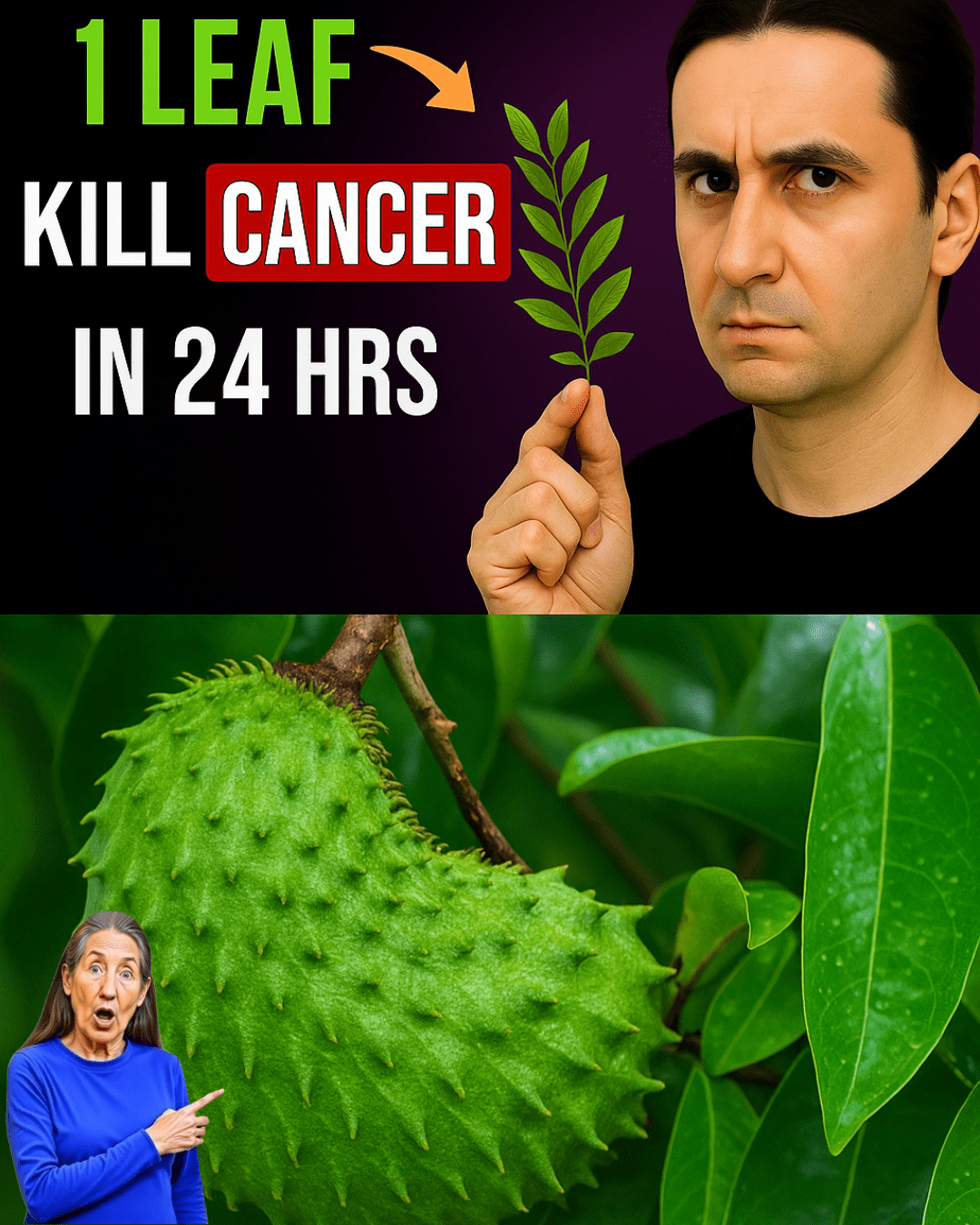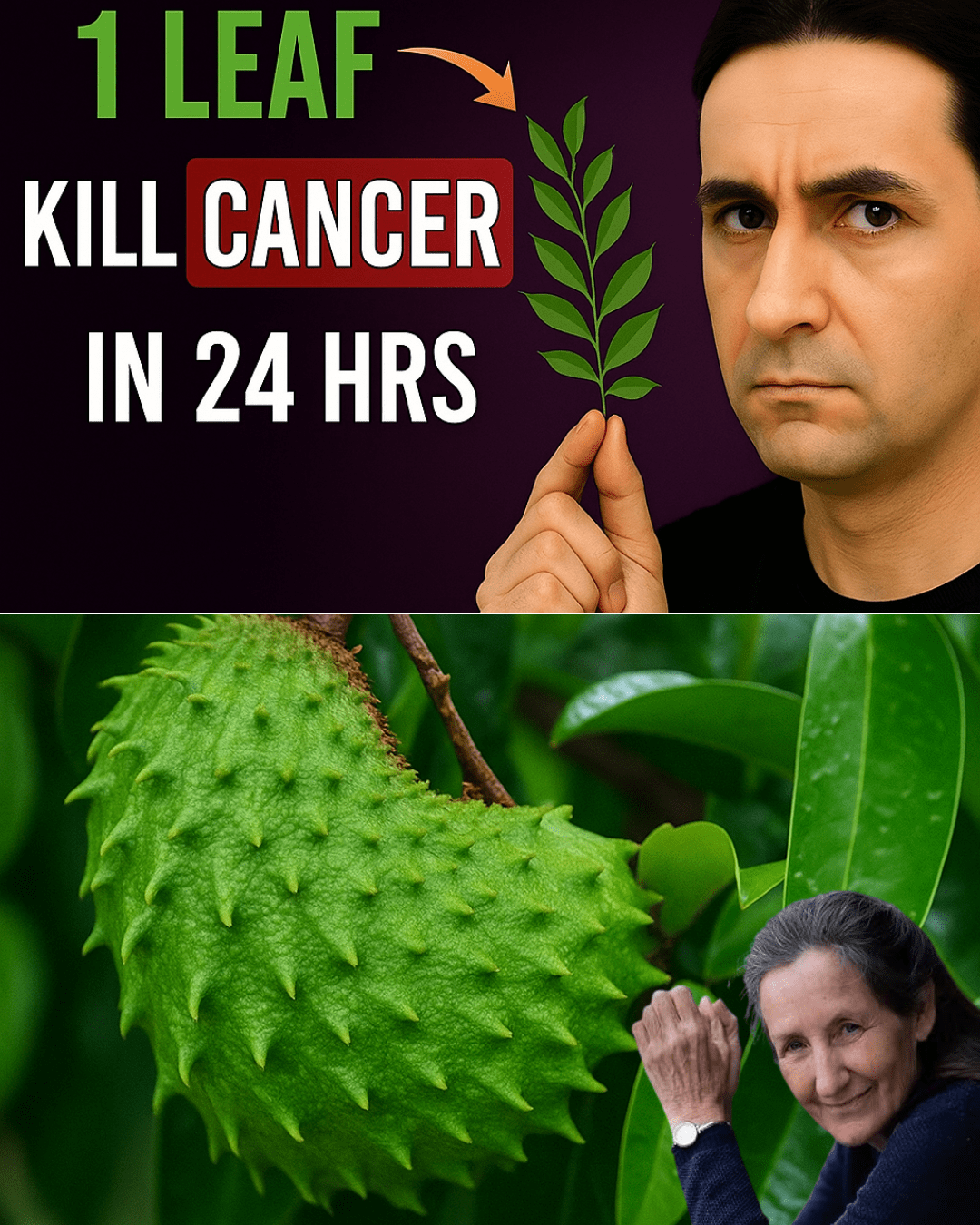In the lush, vibrant ecosystems of the tropics, a fruit known as Soursop (or Graviola) has quietly reigned for centuries. Its prickly green exterior and creamy, aromatic flesh make it a culinary delight. Yet, it is the humble, unassuming leaf of this very tree that has become the focus of a viral phenomenon—a miraculous claim whispered across the internet: One leaf can kill cancer in 24 hours. This sensational promise, fueled by desperate hope and circulated globally, presents a profound dilemma. Is this a genuine, pharmaceutical-grade breakthrough hidden in plain sight, or is it a dangerous distortion of traditional medicine that puts lives at risk?
The truth is complex, nestled deep within the unique chemical structure of the plant. Scientific scrutiny confirms that soursop leaves are packed with potent compounds called acetogenins, which have indeed shown remarkable toxicity against cancer cells in laboratory settings. But the journey from a petri dish to a pill that can cure a human in a single day is immense—a gap often bridged by misleading fervor. This article will meticulously dissect the claims, weigh the scientific evidence against the real dangers, explore the traditional uses that are proven, and arm you with the critical, evidence-based knowledge you need to separate the miracle from the myth, ensuring your pursuit of wellness is both informed and safe. Prepare to discover the full, complex story of the Graviola leaf—a truly potent botanical that demands respect, not hype.

🔬 THE SENSATIONAL CLAIM VS. THE SCIENTIFIC REALITY
The aggressive marketing surrounding soursop centers on its acetogenins, which are cytotoxic compounds unique to the Annonaceae family of plants. These compounds are undoubtedly fascinating to researchers, but their real-world application is often misconstrued.
✨ WHAT THE RESEARCH ACTUALLY SHOWS
1️⃣ Targeted Cytotoxicity (The Hope): Laboratory studies (in in vitro and in vivo animal models) have consistently shown that Graviola acetogenins can selectively inhibit and kill certain cancer cells, sometimes appearing to be more potent than some conventional chemotherapy drugs in those specific, controlled environments. This is a significant finding that fuels ongoing research.
2️⃣ Mitochondrial Attack: Acetogenins appear to target the mitochondria (the powerhouses) of cancer cells. Cancer cells often have damaged or inefficient mitochondria. The acetogenins interrupt the energy supply chain, effectively starving and inducing programmed cell death (apoptosis) in the malignant cells.
3️⃣ The “24 Hour” Fallacy: The claim of killing cancer in 24 hours is pure sensationalism. While laboratory experiments may observe cytotoxic effects within that timeframe, these results involve concentrated extracts directly applied to isolated cell lines. Human cancer is a systemic disease; achieving the necessary concentration of the active compound in the body’s tissues without causing severe toxicity is the fundamental challenge of all cancer treatments, natural or synthetic. No scientific evidence supports the claim that consuming a leaf or tea achieves this rapid, systemic cure.
4️⃣ Lack of Human Clinical Trials: Crucially, there are no large-scale, peer-reviewed human clinical trials that prove soursop leaves can cure or effectively treat human cancer in place of or as a definitive alternative to conventional treatment (surgery, chemotherapy, or radiation). The medical consensus remains that soursop is not a standalone cancer cure.
⚠️ THE TOXIC TRAP: A CRITICAL WARNING ON SAFETY
While the potential anti-cancer effects are exciting, the consumption of large quantities of soursop leaves, bark, or concentrated extracts comes with very real, scientifically documented health risks that must not be ignored.
🧠 NEUROTOXICITY AND PARKINSON’S SYNDROME
The most critical safety concern involves the neurotoxicity of certain acetogenins, particularly in the seeds and bark. Research strongly suggests a link between chronic, heavy consumption of soursop products and a condition called atypical Parkinson’s disease (or parkinsonism).
- Alkaloid Accumulation: The plant contains alkaloids that can be toxic to brain cells (neurons), especially those in the substantia nigra, which are critical for motor control.
- Symptoms: Heavy, prolonged use has been associated with neurological symptoms, including movement disorders, tremors, stiffness, and balance problems, mimicking Parkinson’s disease. This is a severe, irreversible risk that drastically outweighs any unproven cancer cure claims.

📉 OTHER DANGERS AND DRUG INTERACTIONS
- Blood Pressure and Sugar: Soursop may lower blood pressure and blood sugar. While potentially beneficial for some, this effect can be dangerous for individuals already taking medication for these conditions, leading to dangerously low levels (hypotension or hypoglycemia).
- Cardiovascular Risk: Due to its powerful properties, excessive consumption may depress cardiac function.
- Gastrointestinal Issues: High doses can lead to nausea, vomiting, and constipation.
🍎 THE PROVEN BENEFITS: TRADITIONAL & DIETARY USES
Setting aside the unproven cancer claims, the soursop plant—particularly the fruit and moderate use of the leaf—remains a highly valuable botanical with numerous scientifically supported traditional and nutritional benefits.
🛡️ IMMUNE SUPPORT AND NUTRITION
1️⃣ Vitamin C Powerhouse: Soursop fruit is an excellent source of Vitamin C, a powerful antioxidant essential for boosting the immune system, fighting free radicals, and synthesizing collagen for healthy skin and connective tissues.
2️⃣ Digestive Wellness: The fruit is rich in dietary fiber, which aids in digestion, prevents constipation, and supports a healthy gut microbiome, which is foundational to overall health.
3️⃣ Anti-Inflammatory Properties: Traditional medicine has long used soursop leaves and bark as a remedy for fever, pain, and rheumatism. The plant’s compounds exhibit measurable anti-inflammatory effects that can help soothe chronic irritation in the body.
4️⃣ Antimicrobial and Parasitic Action: Extracts from the leaves have shown efficacy against certain bacteria, fungi, and parasites. This supports its traditional use in treating internal and external infections and infestations.
😴 SLEEP AND STRESS RELIEF
- Traditional Sedative: Soursop leaf tea has been historically used as a natural sedative and stress reliever. The compounds are believed to help relax the nervous system, promoting calm and restful sleep. A warm cup before bed can be an excellent natural remedy for mild insomnia.
🍵 HOW TO USE SOURSOP SAFELY AND MINDFULLY
If you choose to use soursop leaves for their general tonic, anti-inflammatory, or sedative properties, it is essential to do so mindfully, in moderation, and with full knowledge of the risks.
🌿 THE TRADITIONAL LEAF TEA METHOD
- Moderation is Key: Unlike the viral claims, traditional use dictates using a small, measured amount. Use no more than 2 to 3 dried or fresh soursop leaves per cup of tea.
- Preparation: Bring water to a boil, add the leaves, and simmer for about 5 to 10 minutes. Strain and consume warm.
- Duration: Consume the tea intermittently, not continuously for months or years. Traditional use involved short cycles of consumption, followed by long breaks. Avoid daily, long-term use to mitigate the risk of neurotoxicity.

❌ ABSOLUTELY AVOID
- Seeds and Bark: These parts of the plant contain the highest concentration of neurotoxic alkaloids and should be avoided entirely.
- High-Concentration Supplements: Be extremely wary of concentrated capsules or extracts unless specifically formulated by a medical herbalist and consumed under strict professional supervision.
- Mixing with Prescription Drugs: Never consume soursop products while taking prescription medications for high blood pressure, diabetes, or psychiatric conditions without explicit approval from your doctor, as the plant may dangerously amplify the effects of these drugs.
⚖️ FINAL VERDICT: BALANCING HOPE AND HARM
The story of the Graviola leaf is a powerful lesson in the necessity of scientific caution in the face of sensational claims. Yes, soursop contains powerful anti-cancer agents that warrant continued research and offer great hope. But no, one leaf will not cure cancer in 24 hours. To present it as such is not only false but actively harmful, potentially leading vulnerable individuals to abandon proven medical treatments for a toxic, unproven home remedy.
The true value of soursop lies in its traditional, moderate use as a nutritional powerhouse, an immune supporter, and a gentle natural remedy for common ailments. Embrace the fruit for its vitamins and fiber. Use the leaf tea mindfully for its anti-inflammatory and calming properties. But always respect its potent chemistry, and ensure that all serious medical conditions, especially cancer, are managed through the established, rigorous protocols of qualified healthcare professionals. Your life—and your nervous system—are too precious to risk on a social media myth.
Would you like to explore other proven, evidence-based anti-inflammatory foods that can safely be incorporated into a wellness-focused diet?






